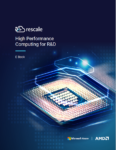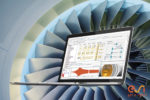In this sponsored post, our friends over at Silicon Mechanics discuss how solving mission-critical problems using AI in the aerospace and defense industry is becoming more of a reality. Every day, new technologies emerge that can simplify deployment, management, and scaling of AI infrastructure to ensure long-term ROI. There are several questions to ask yourself to ensure deploying AI workloads, and harnessing the full potential of data, in aerospace/defense is much more plausible and efficient.
High Performance Computing for R&D
In this eBook, sponsored by Rescale, Microsoft Azure and AMD, we take a look at HPC deployments in support of R&D efforts. In many ways, the HPC solution in the cloud offered by Rescale on Azure delivers an unprecedented amount of power while solving for many crucial and common challenges faced by R&D and design teams across many industries.
Video: HPC for Instabilities in Aerospace Propulsion Systems
Thierry Poinsot from Toulouse Fluid Mechanics Institute gave this talk at PASC19. “This talk focuses on aerospace propulsion where optimization often leads to the occurrence of instabilities where combustion couples with acoustics, leading to unacceptable oscillations (the most famous example is the Apollo engine which required 1330 full scale tests to reach acceptable oscillation levels). The talk will show how simulation is used to control these problems, in real gas turbine engines and in rocket engines.”
Aerospace Moving Forward with Modeling and Simulation
In this special guest feature from Scientific Computing World, Gemma Church writes that the aerospace industry is stuck in the past – but it isn’t due to a lack of new simulation and modeling techniques. “While there have been incremental improvements, in terms of creating quieter and more fuel-efficient aeroplanes, there is not a lot of innovation coming in, compared to the last century when we created aeroplanes moving at the speed of sound and made air travel available to the masses.”
Big Compute Podcast: Boom Supersonic looks to HPC Cloud
In this Big Compute Podcast, host Gabriel Broner interviews Josh Krall co-founder and VP of Technology at Boom Supersonic. Boom is using HPC in the cloud to design a passenger supersonic plane and address the technical and business challenges it poses. “We witnessed technical success with supersonic flying with Concorde, but the economics did not work out. More than forty years later, Boom is embarking in building Overture, a supersonic plane, where passengers will pay the price of today’s business class seats.”
NEC Steps Up with AMD EPYC Servers for Aerospace and Automotive
In this video, NEC’s Oliver Tennert and AMD’s Dan Bounds describe how the two companies are developing high density computing solutions using AMD EPYC processors and liquid cooling for the aerospace and automotive industries. “More and more datacenters put a lot of efforts into reducing their cooling costs even further by making the leap to direct hot-water cooling. In this concept the water has an inlet temperature of up to 45 degrees Celsius and directly cools CPU, memory and other equipment by elements that are part of a closed water circuit. NEC works together with AMD to enable the best solution for each datacenter.”
Video: Rescale Night Showcases HPC in the Cloud
“Billed as an exposition into ‘The Future of Cloud HPC Simulation,’ the event brought together experts in high-performance computing and simulation, cloud computing technologists, startup founders, and VC investors across the technology landscape. In addition to product demonstrations with Rescale engineers, including the popular Deep Learning workshop led by Mark Whitney, Rescale Director of Algorithms, booths featuring ANSYS, Microsoft Azure, Data Collective, and Microsoft Ventures offered interactive sessions for attendees.”










